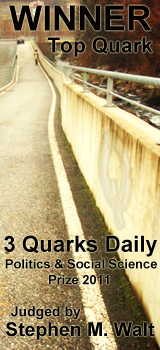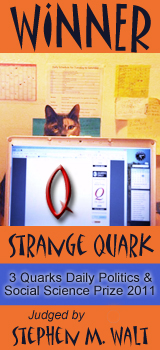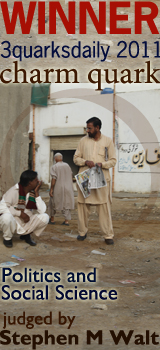


Stephen M. Walt has picked the winners:
1. Top Quark, $1000: Kenan Malik, Rethinking the Idea of “Christian Europe”
2. Strange Quark, $300: David Graeber, On the Invention of Money
3. Charm Quark, $200: Corey Robin, Revolutionaries of the Right: The Deep Roots of Conservative Radicalism
Here is what Professor Walt had to say about them:
Picking three winners from the nine impressive finalists was not an easy task. In judging the different selections, I looked for writing that combined clarity and verve and made a topic of enduring interest come alive. Did the author help the reader see connections previously unnoticed, or bring into sharp relief a phenomenon that had been forgotten or misunderstood? Did the article advance a novel argument with such force that even skeptical readers might be convinced? That is the essential feature of deep analysis and sharp writing: it forces us to question our prior beliefs and see the world anew. Each of the nine nominees succeeded in considerable measure, but for me, these three stood out.
#1 Top Quark: Kenan Malik, “Rethinking the Idea of 'Christian Europe',” Pandaemonium (August 12, 2011).
Soldiers in today’s culture wars believe “European civilization” rests on a set of unchanging principles that are perennially under siege—from godless communism, secular humanism, and most recently, radical Islam. For many of these zealots, what makes the “West” unique are its Judeo-Christian roots. In this calm and elegantly-written reflection on the past two millenia, Malik shows that Christianity is only one of the many sources of “Western” culture, and that many of the ideas we now think of as “bedrock” values were in fact borrowed from other cultures. This essay is a potent antidote to those who believe a “clash of civilizations” is inevitable—if not already underway—and the moral in Malik’s account could not be clearer. Openness to outside influences has been the true source of European prominence; erecting ramparts against others will impoverish and endanger us all.
#2 Strange Quark: David Graeber: “On the Invention of Money – Notes on Sex, Adventure, Monomaniacal Sociopathy and the True Function of Economics,” naked capitalism.com (September 13, 2011).
Where did money come from? Graeber takes the standard economists' explanation–dating back to Adam Smith–and leaves it (and a few of its defenders) in shards. Instead of simply assuming that money emerged from the process of barter (as economists are wont to do), Graeber marshals an array of anthropological evidence demonstrating that money first arose as a means of account within non-state bureaucracies (such as Sumerian religious temples). It’s a tour de force of sustained argumentation, leavened by incisive writing and deadly flashes of wit, and it tells you a lot about how social science ought to be done (but often isn’t).
#3 Charm Quark: Corey Robin, “Revolutionaries on the Right: the Deep Roots of Conservative Radicalism,” www.coreyrobin.com (September 27, 2011).
Why are today's so-called “conservatives” so enamored of far-reaching social and political transformations, not to mention costly and ill-fated efforts to export “liberty” at the barrel of a gun? Far from being traitors to true conservatism, Robin argues that today's conservative radicals are drawing upon a tradition of discourse dating back to Edmund Burke’s fear that established orders cannot generate the passion and commitment needed to vanquish revolutionary movements. To defeat Jacobinism and its various revolutionary successors, in short, die-hard “conservatives” have to fight fire with fire. And from these deep roots arises a “conservatism” that takes no prisoners and leaves few traditions unscathed. It is the “conservatism” of NSC-68 (which told Cold Warriors not to shrink “from any means, overt or covert, that could frustrate the Kremlin’s design”), of the Patriot Act, and of today’s drone wars and targeted killings. It takes real imagination to help us see Burke afresh, and Robin provides it here.
Congratulations also from 3QD to the winners (I will send the prize money later today or tomorrow–and remember, you must claim the money within one month from today–just send me an email). And feel free to leave your acceptance speech as a comment here! And thanks to everyone who participated. Thanks also, of course, to Stephen M. Walt for doing the final judging.
The three prize logos at the top of this post were designed by me (top and strange) and Sughra Raza (charm). I hope the winners will display them with pride on their own blogs!
Details about the prize here.
